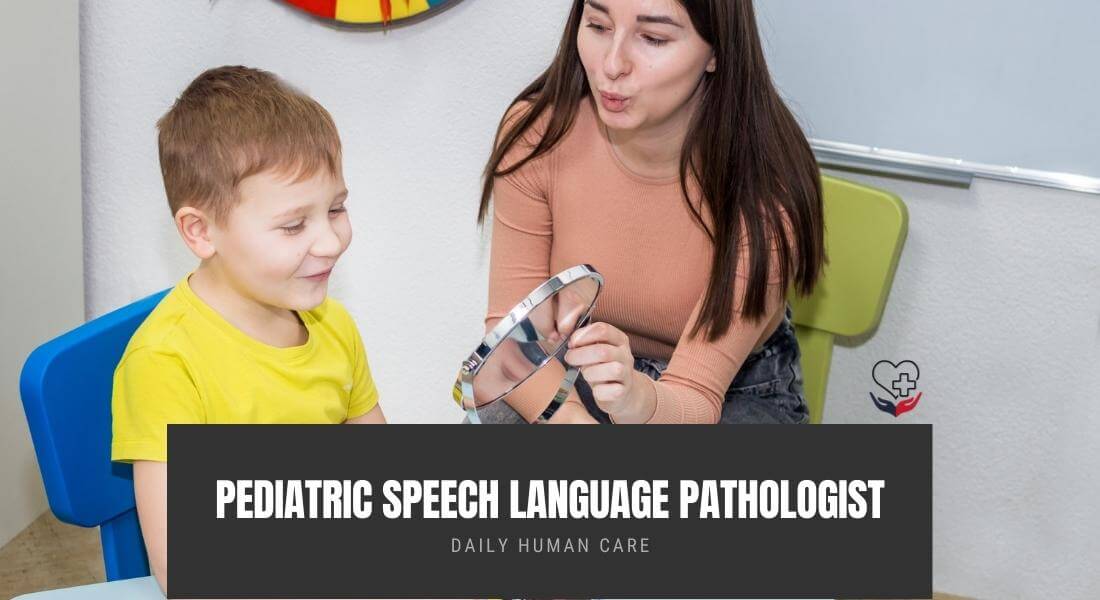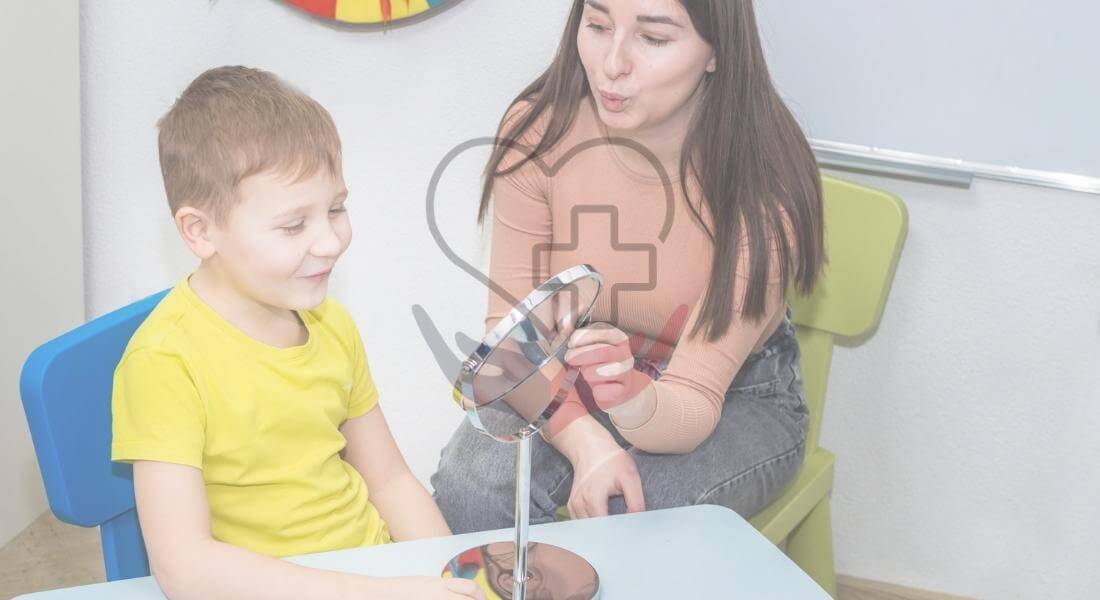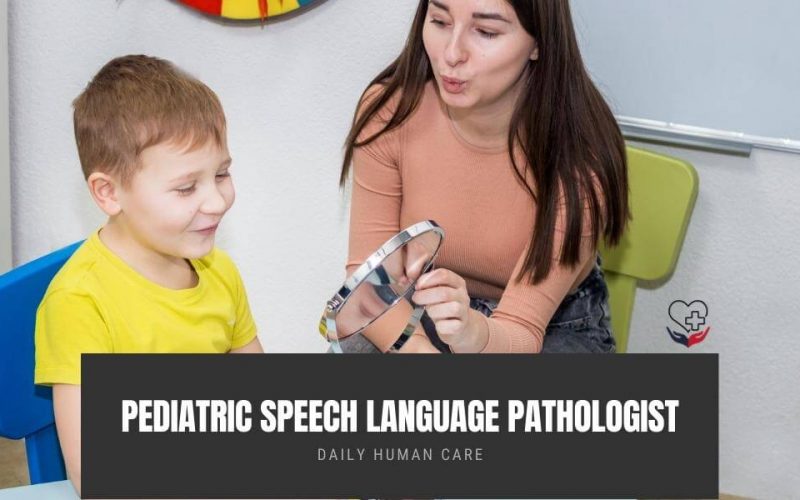Before moving to pediatric speech language pathologist, Daily Human Care is first going to discuss what is speech therapy.
Table of Contents
What is speech therapy?
Speech-language pathologist definition: Speech therapy is concerned with diagnosing and treating people who have issues with their ability to communicate effectively due to issues with their speech. Speech-language pathologists (SLPs), often known as speech therapists, are the people who carry out this therapy.
Improved communication can be achieved through speech therapy. Therapy for specific types of speech and language disorders may involve articulation therapy or language intervention activities.
An adult who has suffered a stroke or other brain injury and now has difficulty speaking may benefit from speech therapy.
Pediatric speech language pathologist:
Communicative problems affect a large number of children. Stuttering, lisping, muteness, or a delay in speech development are all frequent in children. Children are also affected by cognitive-communication disorders, swallowing problems, and voice problems. SLPs who specialise in treating children with speech and communication disorders, such as those described above, are known as pediatric speech-language pathologists (SLPs).
What is a pediatric speech language pathologist?
In order to help children communicate more effectively, speech pathologists work with them on both their verbal and nonverbal abilities. Pediatric speech pathologists focus on preventing, evaluating, diagnosing, and treating various communication-related illnesses that impact children.

So, what exactly is a Pediatric Speech language Pathologist then? A paediatric speech pathologist is a specialist who specialises in the diagnosis and treatment of children’s communication and swallowing difficulties. Some issues do not necessitate the use of words. Social communication, literacy, and cognitive deficits are just a few of the issues that some patients have to deal with.
Helping children with speech and language problems, paediatric SLPs improve the well-being of their patients. The diagnosis and treatment of children with autism spectrum disorders will be greatly aided by the work of a paediatric SLP.
What does it feel like to be a speech pathologist? ” For those who desire to make a difference in children’s lives for the better while also pursuing a gratifying, flexible, high-growth and financially lucrative job, becoming a child speech pathologist is a great choice.
There is a wide range of disorders of language and speech that paediatric speech-language pathologists may treat in a variety of settings such as schools, health care facilities, clinics, and private practises, including those caused by neurodevelopmental conditions such as developmental delays, muscular disorders, or brain damage.
Also read All about children’s speech pathalogist.
what does a pediatric speech pathologist do?
Pediatric speech pathologists’ primary purpose is to help children improve their ability to communicate, but what do paediatric speech pathologists actually do? Initial screening and assessment are carried out before a diagnosis is made, and then therapy is initiated depending on the diagnosis.
In other words, these are the three most important things they do every day:
Initial screening and assessment
Pediatric Speech Language Pathologists (SLPs) begin each new patient’s treatment by doing an initial assessment for communication and swallowing difficulties. Afterwards, they will conduct an evaluation and provide a diagnosis.
Diagnosis
After examining the issue, the SLP will conduct diagnostic tests in order to correctly identify the child’s disorder. SLPs encounter a wide range of diagnoses, including but not limited to:
- Speech apraxia is when a person knows what they want to say but is unable to articulate it clearly.
- Speech slurred by dysarthria is a motor speech condition.
- Spasmodic Dysphonia is a condition in which the voice cords twitch uncontrollably
Many pediatric speech language pathologists (SLPs) work with children who are deaf, mute, or have communication challenges related to autism. A diagnosis must be made by a paediatric speech pathologist before treatment may begin.
Treatment
A paediatric SLP will not only give advice to the child and family on how to deal with and prevent the disorder, but will also provide treatment services, such as cognitive, comprehension, and expression therapy.
How Long Does It Take to Become a Pediatric Speech language Pathologist?
In order to work as a paediatric speech-language pathologist, you must be willing to put in the time and effort necessary, but it will be all worth it when you are able to assist children to improve their communication skills on a daily basis. In other words, how long does it take to get certified as a paediatric speech pathologist? Assuming a bachelor’s degree, two master’s degrees, and a year in a fellowship, it might take seven years to become a paediatric speech-language pathologist.
How to become a speech pathologist?
- Earn a bachelor’s degree in a related field.
- Earn a Master of Science in Speech-Language Pathology.
- Pass the Praxis Examination in Speech-Language Pathology.
- Complete your clinical fellowship.
- Obtain licensure and certification.
The Skills You’ll Need to Succeed in the Field of Child Speech Pathology
In addition to a strong work ethic and commitment, a Pediatric Speech language Pathologist needs to focus on developing and maintaining good clinical skills.
Communication Skills
Obviously, this isn’t a surprise. One of the most crucial qualities of an excellent paediatric speech pathologist is listening. For children with speech and language difficulties, they require a clinician who will devote all of their time and energy to finding solutions. Additionally, the parents of these children need someone who is empathetic and can empathise with their concerns and anxieties. When providing treatment plans, an SLP must be compelling and clear in addition to being able to listen well.
Critical Thinking Skills
When working with a new patient, a paediatric speech language pathologist (SLP) must have excellent critical thinking and analytical abilities. A speech-language pathologist (SLP) must consider the unique characteristics of each child while developing a treatment plan.
Skill of Problem-Solving
Problem-solving and critical thinking go hand in hand. When it comes down to it, a paediatric speech pathologist’s job is to solve a child’s problem. It doesn’t matter how many times an SLP has encountered the same diagnosis, each child is unique and deserves a tailored treatment plan. There are several communication and speech issues that a paediatric speech language pathologist (SLP) must deal with.

How much does a speech pathologist make?
In the discipline of speech pathology, there is a vast spectrum of patient demographics and a number of diseases that can be addressed by professionals. As a speech-language pathologist (SLP), some SLPs have private offices while others work in public hospitals, while others work in skilled nursing facilities. Salary ranges are as wide as the breadth of the field itself. With a yearly median wage of $80,480, the top 10 percent of earners earn an average of $122,790 each annum.
As with most professions, the cost of living affects the pediatric speech language pathologist salary. The average salary for a speech-language pathologist (SLP) in New York City is $107,080, whereas the salary for one in Dallas is a little over $69,000. Either way, a career in speech pathology is a financially and personally rewarding one.




